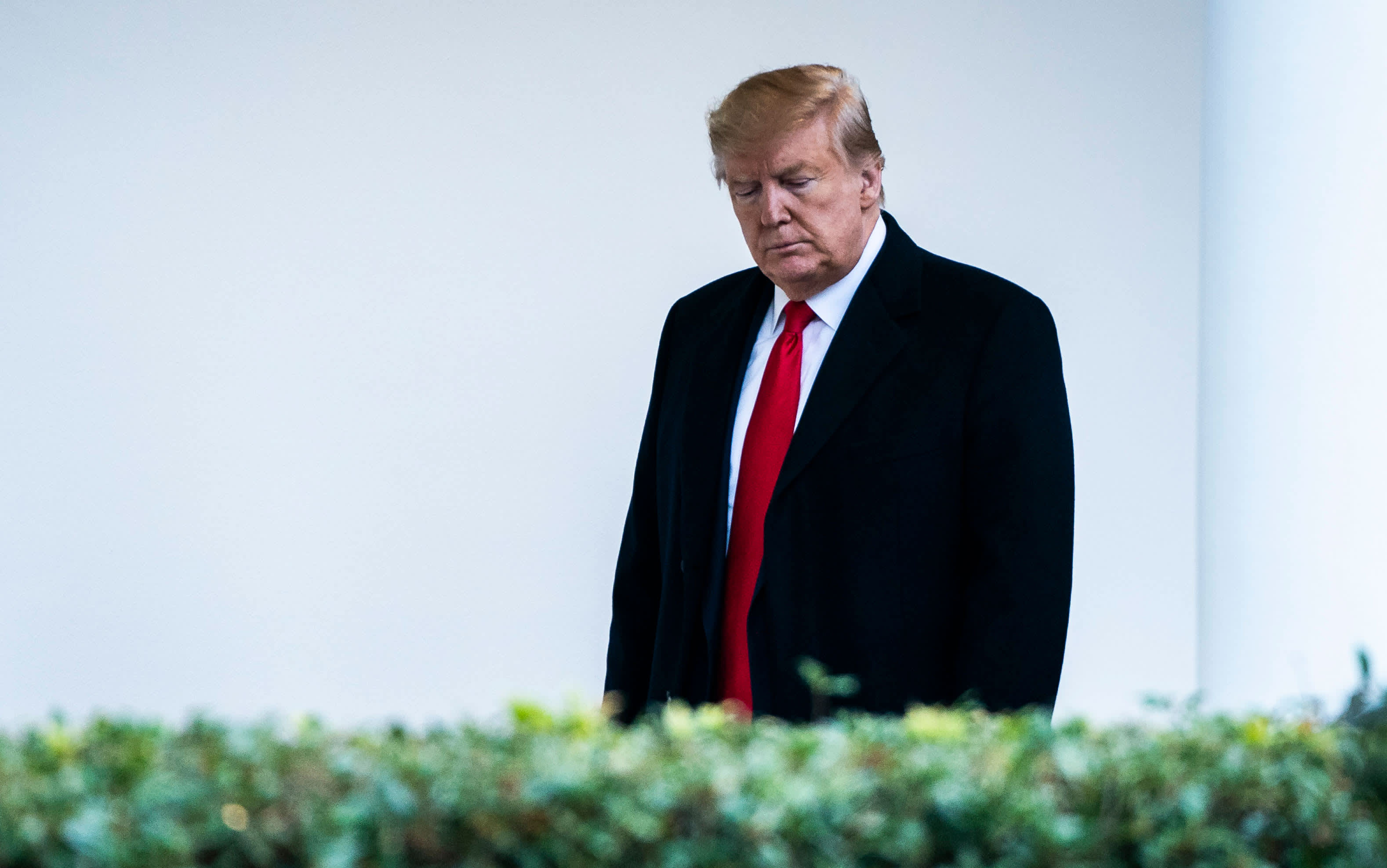President Donald Trump has long pointed to the stock market’s success under his administration as a tangible endorsement of his economic policies and had often boasted about the Dow Jones Industrial Average’s gains since his election. That was, of course, before investors knew about the new coronavirus.
With COVID-19 and measures to contain its spread seeding economic angst across the globe, the Dow’s steep drop on Monday pushed the 30-stock index below the level where it closed on Nov. 8, 2016, the day Trump won the 2016 election over Democrat Hillary Clinton.
The sell-off is part of a historic market meltdown that has sent the Dow down nearly 40% since last month.
Dow Industrials fell 841.24 points, or 4.39%, to trade below its close on Election Day 2016 at 18,332.74. The sell-off on the week’s first day of trading put the index down more than 38% from its all-time high notched in February. The S&P 500 was more than 30% below its February high by Friday’s close.
The latest setback for Trump comes after the Dow last week fell below the level it traded at prior his inauguration. At that time it still managed to retain its post-election gains, when Wall Street snapped up stocks as the promise of corporate tax cuts and regulation rollback was enough for investors to bet on U.S. profit growth.
“I’m very hopeful and optimistic on what [Trump’s election] means,” billionaire investor Stanley Druckenmiller said on Nov. 10, 2016. “The fears of protectionism, while valid, are greatly oversized relative to the benefits to the other parts of the economy [from deregulation and tax reform].”
“This economy is so over-regulated and people are just drowning in red tape, that the removal of that, and I’m expecting serious tax reform, cuts to the corporate tax rate. … So I’m quite, quite optimistic on the economy,” he added at the time.
But U.S. stocks have been in a violent free fall over the last month as efforts to contain COVID-19 stoke fears of a global recession. Federal and state governments have forced the closure of businesses and borders around the world, which economists warn will likely lead to significant job loss and GDP growth declines.
Those fears have manifested themselves in the stock market’s plunge. But the losses may prove a tough blow to Trump, who has for years used the Dow as an effective referendum on the success of his economic agenda.
Most recently, Trump highlighted on March 13 an autographed chart showing the Dow spiking at approximately the same time he began an emergency coronavirus press conference.
But Trump’s fixation on day-by-day stock market is hardly new: Less than one month into his presidency he boasted on Twitter that equities had hit a new record.
“Stock market hits new high with longest winning streak in decades,” he wrote on Feb. 16, 2017. “Great level of confidence and optimism – even before tax plan rollout!”
The president has largely come through on his promises to lower the corporate tax rate and ease regulations on many of the nation’s largest companies. Trump and Republican lawmakers passed the landmark Tax Cuts and Jobs Act in late 2017 that cut the rate U.S. corporations pay to 21% from 35%.
But now, Trump faces a new threat that he must overcome in the form of the novel coronavirus, which threatens to tip the U.S. economy into a recession and has sent the U.S. equity market spiraling deeper into a bear market.
Federal lawmakers are haggling over a massive fiscal stimulus bill, which failed a key procedural Senate vote on Sunday after the chamber’s Democrats warned the measure did not do enough to help impacted workers. Still, Treasury Secretary Steven Mnuchin told CNBC on Monday that Democrats and Republicans are nearly in agreement on the package.
“I think we’re very close. We need to get this deal done today,” Mnuchin told CNBC’s Jim Cramer. “It is very important as you can see, Jim. We announced overnight with the Fed some very important actions supporting the asset-backed market, supporting the corporate bond market — primary and secondary.”
Senate Republicans last week rolled out a roughly $1 trillion proposal after working closely with the administration in a bid to slow COVID-19’s impact on the economy. As on Monday, more than 35,000 have tested positive for the illness in the United States.
Subscribe to CNBC PRO for exclusive insights and analysis, and live business day programming from around the world.
